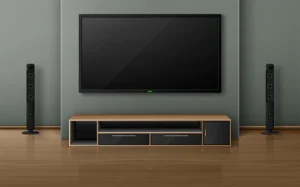8 Basic Considerations for Your Home Theater Room
Setting up a home theater room is not as straightforward as some people might think. There are quite a few things to consider before you commit, particularly if you have no prior experience with this sort of thing or your plans are to take on the project alone.

The purpose of this article is to provide you with the basics that you have to take in as someone pursuing the idea of a home theater room.
Prepare a Dedicated Room
Start with picking up a room in your home that you can dedicate to the theater. The idea is pretty much futile if you cannot commit an entire room. Why? Because a home theater, while still feeling small, should still be large enough to create the necessary atmosphere and add the required components.
You do not have to pick the biggest room in your house. Just use one that fits your expectations and is large enough to fit what you want to see in it.
Manage the Lighting
To set the right atmosphere, you want to work on ambient light. There are certain ways to modify and introduce that sense of feeling as if you were in a real movie theater.
However, for starters, you should focus on eliminating the sources of light. Natural light is not really a thing you want to see in a cinema, and your dedicated movie theater room is not an exception.
Manage Sounds
By sound management, we do not mean needing to optimize your setup devices and eliminate no sound issues and other related problems. No, that comes later.
While preparing the room, it is necessary to work out what you can do in terms of soundproofing. If you want an optimal cinema experience, third-party sounds should be eliminated as much as you can.
Some people go as far as sealing cracks in the walls, adding second layers as soundproof, and so on.
Of course, if you live in a relatively quiet home, then you probably do not have to worry about ambient sounds as much.
On the other hand, if you do go for an overhaul and end up modifying the walls, it will also give you an opportunity to have less hassle adding in-wall speakers.
Have an AC System Installed
If you have ever gone to a cinema during summer, you must have noticed how good the breeze feels when the weather outside is scorching. One thing you have to consider is how you are going to approach this problem.
Sure, you could argue that watching movies during summer might not be as popular since there are other activities to do. And even if you are watching, it is most likely in the evenings when the temperature is not that high.
However, it is also worth noting that some people are in locations that are hot all year round, and if they want to avoid suffering while in their home theaters, an AC is a must to have.
Add Cinema Elements
By cinema elements, we mean things that you usually find in a real cinema. A lot depends on your budget and how much room you have available, but going for something like a popcorn machine, tiered seating, red velvet walls, and so on, is worth considering.
If your goal is to create a true cinema experience rather than simply having room to watch movies, then you will have to take the extra mile.
Consider a Drop-Down Screen
A little touch with the help of a drop-down screen is what can make your home theater feel more authentic.
There are systems that let you mimic those drop-down screens you find in cinemas. You can lower and raise them manually, or invest in technology that lets you modify the screen’s height with a press of a button.
Pain the Room Dark
Introducing more darkness might feel a bit negative, particularly if you have to spend a lot of time inside a room. However, such an idea is exactly what you need for a home theater.
Dark paint for walls and ceiling is what you want to go for. You might hear suggestions about painting the ceiling so that it reflects the light. Light reflection is not what you want to see in a home theater, though.
Close the Windows
The last bit of advice is pretty straightforward. You want to close the windows so that there is no sound or light coming into the room. Blinds should do the job as well, though you might also end up seeking a more permanent solution, such as boarding the windows of your home theater up. Do be mindful of potential safety hazards if you take that approach, though.
